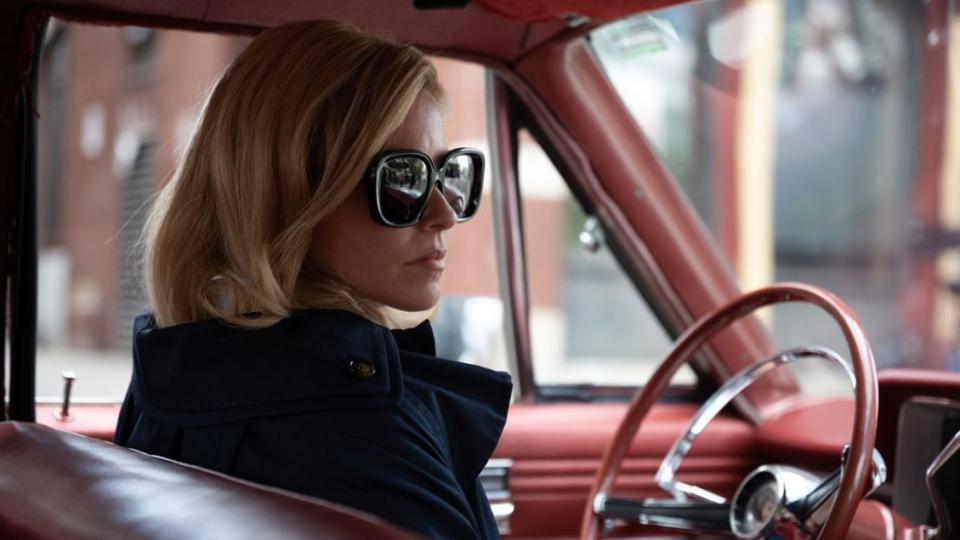Call Jane Review: The Fight for Reproductive Justice Gets a Human Face
- Oops!Something went wrong.Please try again later.
- Oops!Something went wrong.Please try again later.
The post Call Jane Review: The Fight for Reproductive Justice Gets a Human Face appeared first on Consequence.
The Pitch: Conservative Chicago housewife Joy Griffin (Elizabeth Banks) is blissfully expecting her second child in 1968 when she begins experiencing dizzy spells and, one day, collapses while cooking dinner. At the hospital, she receives a grim diagnosis of cardiomyopathy that could result in heart failure if she remains pregnant.
But the hospital board quickly, unanimously declines to grant permission for a “therapeutic termination” of the pregnancy to save the mother’s life. (Veteran character actor Bruce MacVittie of The Sopranos and Million Dollar Baby has a small but memorable turn as the cruelly indifferent hospital director, one of his final roles before his death in May.) A receptionist cheerfully suggests, “Just fall down a staircase, it worked for me.” Going home and standing atop her stairs, Joy contemplates that desperate measure in a brief but viscerally suspenseful scene.
Soon after, she lays eyes on a fortuitous poster: “Pregnant? Anxious? Get help! Call Jane 555-0144.” A group of activists offering illegal abortions, led by Virginia (Sigourney Weaver), saves Joy’s life, and soon she’s drawn into their orbit, helping other women in need.
Call Jane is a fictionalized story of the real Jane Collective that operated in Chicago in the late ‘60s and early ‘70s. But the context around the Call Jane has shifted significantly since it was filmed a year ago, or even since February, when Roadside Attractions picked up the film following its premiere at Sundance. Instead of a snapshot of life just before Roe v. Wade, Call Jane now offers a stark look at what American woman are up against after the Supreme Court overturned Roe in June.
Broad Strokes: Phyllis Nagy, an accomplished playwright, received an Oscar nomination for writing the 2015 Todd Haynes film Carol, and two Emmy nominations for writing and directing the 2006 HBO movie Mrs. Harris. But Call Jane is the first theatrical feature directed by Nagy, and it establishes her as a skilled stylist with a light touch.
Shooting the period piece on 16mm film helps Nagy capture the era without calling too much attention to the hair and fashion. And her use of music is creative, seamlessly transitioning from a non-diegetic soundtrack of Vanity Fare’s “Early in the Morning” in one scene to the song playing on a character’s car radio in the next.

Call Jane (Roadside Attractions)
Unfortunately, Nagy’s direction is sometimes ill-served by the more broad and simplistic elements of the script by Hayley Schore and Roshan Sethi, which appeared on the 2017 Black List, an annual Hollywood survey of the best unproduced screenplays. When Joy’s situation is at its most dire, rain begins pouring down as if on cue. When she begins spending more time with the Jane Collective and isn’t home to cook dinner, her attorney husband Will (Chris Messina) struggles with the mechanics of turning the oven on in a particularly sitcom-y sequence.
Joy’s political awakening is unsubtly illustrated in a series of pat scenes: She happens upon the riots at the 1968 Democratic National Convention in the opening moments of Call Jane, and remarks to Will that she could “feel a shifting current” after witnessing the Yippie protests.
Later, Joy flips through her 15-year-old daughter’s records, and winds up cheerfully dancing in the kitchen to the Velvet Underground’s White Light/White Heat. By the end of the movie, she’s smoking weed with a Jane Collective compatriot, and shocking her neighbor Lana (Kate Mara) by not supporting Nixon’s re-election.
Women in Revolt: Elizabeth Banks is best known for supporting roles in the Hunger Games films and comedies like Pitch Perfect and Wet Hot American Summer. And she was cast as Joy only after the part briefly belonged to Elisabeth Moss, who had to exit Call Jane due to scheduling conflicts.
But Banks steps confidently into Call Jane as the kind of dramatic lead role she probably should’ve started getting a decade ago, and she and Weaver get to flex their comedic chops, briefly but memorably, in a scene where they give an anatomy lesson to a young client, Izzy (Eleanor Koski).
The Jane Collective has to rely on a “capitalist pig” doctor, Dean (Cory Michael Smith), to perform abortions, and Dean’s steep asking price becomes the central conflict for most of the movie, as the collective wrestles with charging most of their clients $600 for the procedure (for some perspective, that’s equivalent to roughly $5,000 in 2022). In one Call Jane’s standout performances, Smith positively oozes frat boy arrogance as he tries to flirt with Virginia, telling her, “Older broads really do it for me.”
The Verdict: Call Jane wasn’t designed to be a political lightning rod released just after a historic Supreme Court decision, and that may be the best thing about it. Nagy puts an identifiable human face on the women who need abortions, and all the different reasons they can arrive at that decision. And Banks capably leads a stellar ensemble that elevates the sometimes clumsy screenplay.
Call Jane is unflinching in its look at the medical realities of abortion. But the most painful part of watching the movie from the vantage point of 2022 is seeing the characters arrive at 1973 and celebrate the Roe v. Wade verdict, unaware of what lay ahead.
Where to Watch: Call Jane opens in theaters on October 28th.
Trailer:
Call Jane Review: The Fight for Reproductive Justice Gets a Human Face
Al Shipley
Popular Posts
Leslie Jordan Killed in Car Crash After Suffering Medical Emergency
Kanye West Escorted Out of Skechers Headquarters After Showing Up Uninvited
All 275 Songs Jack Antonoff Has Produced, Ranked From Worst to Best
Kid's Impressive Street Performance of "Master of Puppets" Earns Props from Metallica: Watch
Kanye West Tried to Intimidate Adidas Executives by Showing Them Porn

